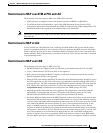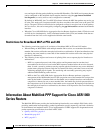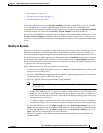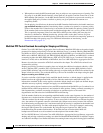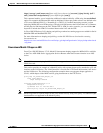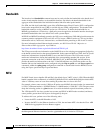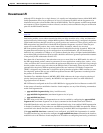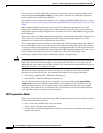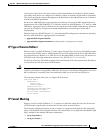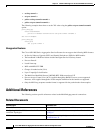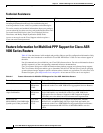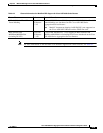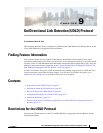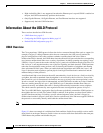
8-15
Cisco ASR 1000 Series Aggregation Services Routers Software Configuration Guide
OL-16506-17
Chapter 8 Multilink PPP Support for the Cisco ASR 1000 Series Routers
Information About Multilink PPP Support for Cisco ASR 1000 Series Routers
In the legacy model, there were many instances when fragmentation was enabled by default without
users being aware that it was configured. In addition, packets of moderate length could be fragmented.
This did not provide the expected throughput on the bundle due to the added packet Layer 2 overhead
introduced by MLP fragmentation.
On the Cisco ASR 1000 Series Aggregation Services Routers, this model of MLP fragmentation was
supported until Cisco IOS XE Release 3.7.0. Effective from Cisco IOS XE Release 3.7.1, the Cisco ASR
1000 Series Aggregation Services Routers do not support this mode of MLP fragmentation. Therefore,
you must now explicitly configure the multilink fragmentation or interleaving to enable MLP
fragmentation.
Effective from Cisco IOS XE Release 3.7.1, the following MLP configuration commands are ignored by
the Cisco ASR 1000 Series Aggregation Services Routers:
• ppp multilink fragment disable
• ppp multilink fragment maximum maximum number of fragments per packet
IP Type of Service Reflect
Effective from Cisco IOS XE Release 3.7.(0)S, support for the IP Type of Service (ToS) Reflect feature
was added on the VPDN group or VPDN template for the L2TP tunnel when the Cisco ASR 1000 Series
Aggregation Services Routers act as LNS devices for broadband MLP sessions. Later, this feature was
also added to the following maintenance releases: Cisco IOS XE 3.4.2, 3.5.1, and 3.6.2.
The IP Type of Service (ToS) Reflect feature allows the IP header ToS value from the inner IP header to
be reflected in the ToS of the outer L2TP IP header.
Caution To prevent MLP packet reordering and fragment or packet holes, the ToS data should not be used to
reclassify and requeue or drop packets at the LAC. Any drops or reordering of MLP packets may cause
MLP reordering or reassembly delays and additional packet loss in the receiving CPE device.
The following example shows how to configure IP ToS reflect:
vpdn-group vpdn-1
accept-dialin
protocol l2tp
virtual-template 1
session-limit 100
terminate-from hostname VPDN-1
lcp renegotiation always
no l2tp tunnel authentication
ip tos reflect
IP Tunnel Marking
Effective from Cisco IOS XE Release 3.7.1, support was added for setting the ToS value in the outer
L2TP IP header using the QoS set tunnel action or the policer set tunnel action.
The following configuration options of the set actions are supported when applied to the output QoS
policy of the multilink virtual template interface. This functionality is not supported in the Model-F QoS
policy attached to the member-link parent subinterface.
• set ip dscp tunnel xx
• set ip prec tunnel xx



